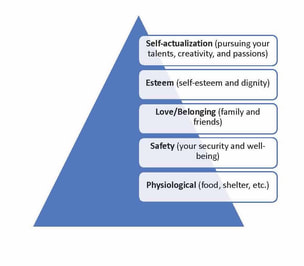|
In a recent Music Career Development and Entrepreneurship class, we were speaking about how the arts are commonly seen as a want rather than a need, and that the arts are competing not only with each other for the same discretionary funds, but also with sporting events, recreational events, and hobbies. I told the following story about a short-lived music retailer to emphasize the point: Back in the 1990’s, the founder of a highly successful office supply superstore decided to launch a musical instrument company using the same model that brought him success in office supplies. There were a variety of reasons why the model didn’t work in the music products industry, but I half-jokingly said, “Most of the population will at some point today need a pen or a piece of paper, but they likely won’t need a trombone.” Later that day I happened to read an article about Maslow’s hierarchy of needs--and it hit me that the arts fit very clearly at the top of the hierarchy. A quick online search yielded many articles confirming that sentiment. Above is a summary (with my interpretations) for those who don’t remember or haven’t heard of Maslow’s hierarchy of needs. The idea is that to progress up the hierarchy, people must first fulfill their lower-level needs. Even if that is true, and arts and creative activity fit neatly into the highest level of the hierarchy, that doesn’t mean the arts can’t potentially fit into other levels. Everyone in the arts should be emphatic in their support of the arts to achieve self-actualization and assist in enabling people to become the best versions of themselves. But we should also infuse arts into the other levels in the hierarchy. After all, artists enjoy notoriety and esteem; and previous generations wrote poetry and love songs, which clearly reinforces love and belonging.
For the arts to thrive, we need to reframe the narrative by having succinct and clear messaging on the value and benefits of the arts, from a variety of viewpoints—and market it everywhere. We may see modest growth throughout this process, but success won’t be realized until we reframe discretionary to essential. The pandemic illustrated vividly that arts are essential, because in that challenging time, people flocked to the arts in the forms of video and music streaming services, outdoor concerts, and more. How will you reframe the narrative? Thanks for reading, Nick
0 Comments
Leave a Reply. |
AuthorsLearn more about the authors. Archives
June 2024
Categories |



 RSS Feed
RSS Feed
